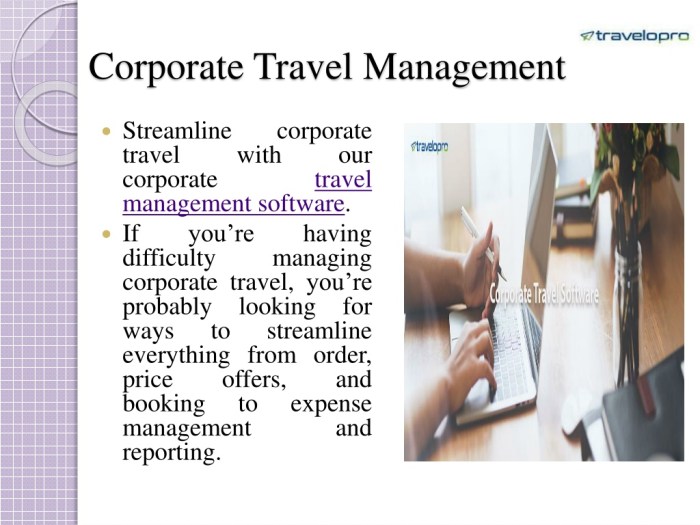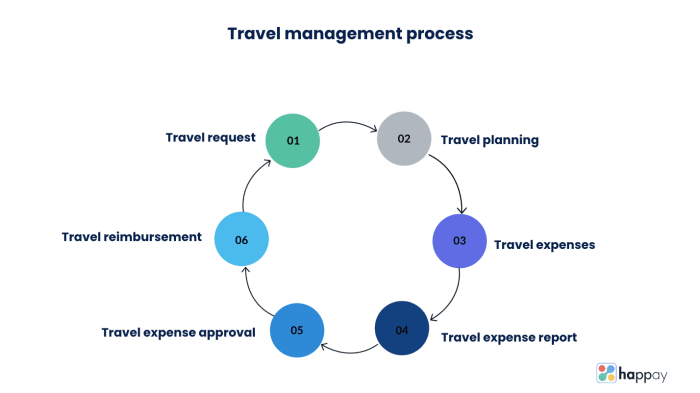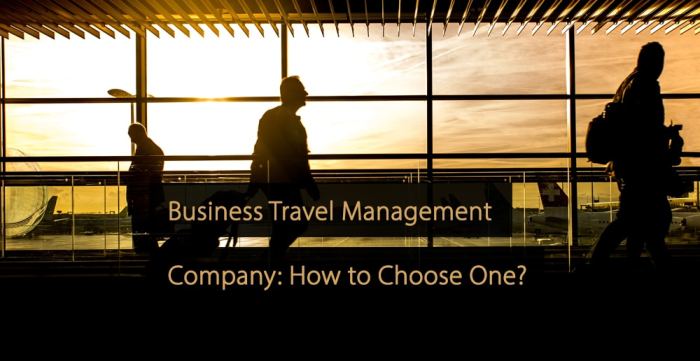Corporate Travel Agent Online Streamlined Solutions
Corporate travel agent online is revolutionizing how businesses manage their travel arrangements. Gone are the days of cumbersome paperwork and endless phone calls. Modern online platforms offer a streamlined, efficient, and cost-effective approach, providing companies with comprehensive tools for booking, managing, and reporting on travel expenses. These platforms offer a wealth of features, from simplified booking processes to sophisticated analytics, empowering businesses to optimize their travel policies and maximize cost savings.
This detailed exploration dives into the advantages of online corporate travel agents, contrasting them with traditional methods. We’ll examine the features, functionality, and benefits for both companies and travelers. The comparison will include specific examples and case studies to demonstrate how online platforms can improve efficiency and reduce costs across various company sizes.
Introduction to Online Corporate Travel Agents
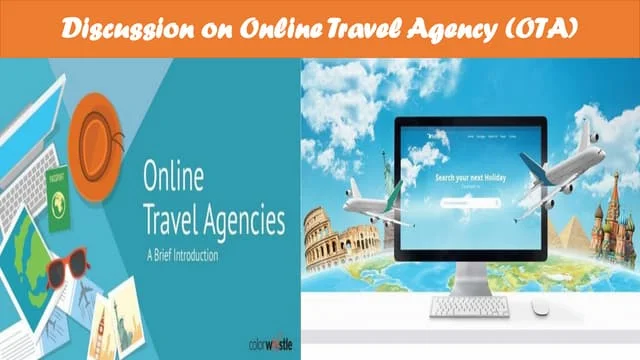
Corporate travel agents play a vital role in managing the complex travel arrangements for businesses. They handle the booking of flights, hotels, and other travel-related services for employees, ensuring smooth and cost-effective travel experiences. This function has evolved significantly, transitioning from traditional methods to leveraging online platforms for enhanced efficiency and cost savings.
The traditional approach to corporate travel often involved dedicated travel agents working with businesses on a contractual basis. This often resulted in a more personalized approach, but was often slower and less transparent. The advent of online platforms has fundamentally altered this process, allowing businesses to access a broader range of options, monitor bookings in real-time, and gain greater control over their travel budgets.
Definition of Corporate Travel Agents
Corporate travel agents are specialized travel professionals who manage and facilitate the travel arrangements for businesses and their employees. Their responsibilities typically include researching, booking, and coordinating travel itineraries, often for multiple employees simultaneously. They aim to optimize travel experiences while minimizing costs and maximizing efficiency.
Evolution of Corporate Travel
The evolution of corporate travel reflects a shift from manual, paper-based processes to digital solutions. Early methods relied heavily on travel agents and phone calls for booking and managing itineraries. This approach was time-consuming, lacked transparency, and could lead to missed opportunities for cost savings. The rise of online platforms, including corporate travel management systems (CTMS), has automated many aspects of the process, offering businesses more control and visibility over their travel expenditures.
Key Features and Benefits of Online Corporate Travel Agents
Online corporate travel agents offer a multitude of features and benefits that streamline the travel process and enhance cost-effectiveness. These platforms often provide advanced search tools for finding the best deals on flights, hotels, and other travel services. Real-time tracking of bookings and comprehensive reporting on travel expenses are common features, allowing businesses to monitor their spending and identify potential savings.
Furthermore, online platforms facilitate automated expense reports and provide detailed analytics on travel patterns, enabling data-driven decision-making regarding future travel strategies.
Role of Technology in Streamlining Corporate Travel Processes
Technology plays a pivotal role in streamlining corporate travel processes. Online booking platforms offer a user-friendly interface for employees to book trips directly, reducing administrative burden on the company. Advanced search engines and algorithms enable businesses to identify the most cost-effective travel options, often offering customized solutions based on specific needs and preferences. Real-time data feeds and automated reporting tools improve transparency and efficiency in travel management.
Comparison of Traditional and Online Corporate Travel Agency Services
| Feature | Traditional Method | Online Platform | Key Difference |
|---|---|---|---|
| Booking Process | Manual, often involving multiple phone calls and emails | Automated, with online booking tools and interfaces | Online platforms significantly reduce manual effort and time spent on bookings. |
| Cost Management | Potential for hidden costs and lack of transparency in pricing | Clear pricing and real-time visibility of travel costs facilitate better cost management. | Online platforms provide greater transparency and control over travel expenses. |
| Expense Reporting | Manual expense reports, prone to errors and delays | Automated expense reporting, often integrated with accounting systems | Automation of expense reporting leads to faster processing and reduced errors. |
| Travel Policy Management | Policies are often not easily enforced or tracked | Travel policies can be embedded directly into the system, enforcing compliance and reducing deviations. | Online platforms enable businesses to enforce travel policies more effectively. |
Benefits and Advantages of Online Platforms
Online corporate travel management systems offer a significant leap forward for businesses, streamlining processes, reducing costs, and enhancing the travel experience for employees. These platforms leverage technology to provide a comprehensive solution for all aspects of corporate travel, from booking flights and hotels to expense reporting.
Companies are increasingly recognizing the value of online platforms, which enable them to optimize their travel spend, improve employee satisfaction, and gain valuable insights into their travel patterns. This translates to a more efficient and cost-effective travel program, allowing businesses to focus on core competencies.
Cost Savings and Efficiency

Online platforms offer substantial cost savings and improved efficiency across various aspects of corporate travel. Automated booking and negotiation tools, combined with real-time data analysis, allow companies to identify and capitalize on potential cost reductions. The elimination of manual processes drastically reduces administrative overhead, freeing up valuable time for travel managers.
- Reduced administrative burden: Online systems automate tasks such as booking, expense reports, and policy enforcement, significantly reducing the workload on travel departments.
- Negotiated rates: Many online platforms have access to exclusive negotiated rates with airlines and hotels, leading to substantial savings compared to booking individually.
- Improved forecasting: Real-time data allows companies to analyze travel patterns and make more informed decisions regarding future travel budgets and strategies.
Improved Booking and Management Capabilities
Online travel management systems provide enhanced booking and management capabilities, allowing companies to maintain better control over their travel programs. These systems offer advanced search filters, customized reporting, and comprehensive traveler profiles, which significantly improve the accuracy and efficiency of the entire process.
- Comprehensive search options: Users can refine their searches using various criteria (e.g., budget, dates, destinations, preferred airlines/hotels) to find the best deals.
- Real-time booking and confirmation: Employees can book trips quickly and efficiently, receiving immediate confirmations and access to important travel details.
- Customized reporting and analytics: Detailed reports and analytics provide insights into travel spending, allowing companies to identify trends and areas for optimization.
Benefits for Travelers
Online corporate travel portals provide a seamless and convenient experience for employees. Real-time information, mobile accessibility, and simplified booking procedures contribute to a more efficient and stress-free travel experience.
- Ease of booking: Travelers can easily access and book flights, hotels, and other travel arrangements through a user-friendly interface, saving significant time.
- Real-time information: Travelers can access updated information about their trips, including flight schedules, hotel details, and travel documents.
- Mobile accessibility: Mobile applications allow travelers to manage their trips from anywhere, ensuring they have access to essential information and support on the go.
Enhanced Communication and Collaboration
Effective communication and collaboration between travel departments and employees are crucial for a successful corporate travel program. Online platforms facilitate this by providing a central hub for communication and information sharing.
- Centralized communication platform: Online platforms offer a shared workspace for travel managers and employees to communicate about travel arrangements, policies, and issues.
- Improved communication channels: Companies can leverage various communication tools (e.g., email, messaging) to streamline interactions between travel departments and employees.
- Streamlined reporting and feedback: Online platforms can facilitate feedback mechanisms, enabling companies to identify areas for improvement in their travel programs.
Cost Savings Comparison
The table below illustrates the potential cost savings achievable through online corporate travel management systems for different company sizes. Note that these are illustrative examples, and actual savings will vary based on specific company needs and travel patterns.
| Company Size | Traditional Costs | Online Costs | Savings |
|---|---|---|---|
| Small (10-50 employees) | $10,000-$25,000 per year | $6,000-$15,000 per year | $4,000-$10,000 per year |
| Medium (51-250 employees) | $25,000-$100,000 per year | $15,000-$60,000 per year | $10,000-$40,000 per year |
| Large (251+ employees) | $100,000+ per year | $60,000+ per year | $40,000+ per year |
Features and Functionality of Online Tools
Online corporate travel agents offer a sophisticated suite of features, significantly streamlining the travel process for businesses. These platforms go beyond basic booking capabilities, providing robust tools for managing travel arrangements, optimizing costs, and enhancing overall travel experiences. They are designed to meet the diverse needs of corporate travel departments, from small teams to large enterprises.
Types of Travel Arrangements Facilitated
Online corporate travel agents facilitate a wide array of travel arrangements, encompassing various needs and preferences. This includes business trips, conferences, employee training, and executive travel, among others. The platforms are designed to accommodate diverse itineraries, including domestic and international travel, utilizing various modes of transportation, from flights and trains to car rentals and hotel accommodations.
Booking Options and Functionalities
Online platforms offer diverse booking options, catering to various user preferences and organizational needs. Users can book individual or group travel arrangements, and often can specify preferences such as preferred airlines, class of service, or specific hotel chains. Advanced functionalities often allow for the integration of corporate travel policies and pre-approved vendor lists, ensuring compliance with company guidelines. Automated booking workflows and secure payment processing are integral components for efficiency and security.
Reporting and Analytics Features
Robust reporting and analytics features are critical for businesses to track and optimize their travel spending. Online platforms provide detailed reports on travel expenses, flight costs, hotel rates, and other relevant data. These reports can be filtered and segmented based on various criteria, enabling businesses to identify trends, patterns, and potential cost savings. Data visualization tools often allow users to analyze trends and patterns to inform future travel decisions.
User Interface and Experience
The user interface (UI) and user experience (UX) of online corporate travel agent platforms are designed for ease of use and intuitive navigation. These platforms are generally user-friendly, featuring clear navigation menus, intuitive search filters, and customizable dashboards. Features such as saved preferences, personalized profiles, and secure access control mechanisms contribute to a seamless and efficient user experience. Mobile-friendly interfaces allow access from any device, further enhancing flexibility.
Advanced Features
Online platforms offer advanced features to enhance efficiency and cost savings. Dynamic pricing allows for real-time adjustments based on market fluctuations, optimizing costs for the company. Personalized itineraries are often generated based on user preferences and corporate travel policies, offering tailored solutions for each trip. Real-time availability features allow for instant updates on flight and hotel options, allowing for swift adjustments to changing plans.
Booking Features
| Feature | Description | Benefits | Example |
|---|---|---|---|
| Real-time Availability | Instant updates on flight and hotel availability, reflecting current market conditions. | Ensures users select the most suitable options and avoids delays. | Checking flight availability on a specific date and time, and confirming immediate booking. |
| Dynamic Pricing | Adjusts prices in real-time based on factors like demand and inventory. | Identifies the most cost-effective travel options. | Comparing flight prices across multiple airlines at different times of the day. |
| Personalized Itineraries | Creates travel plans based on user preferences and company policies. | Streamlines travel arrangements and meets individual needs. | Generating a customized itinerary with preferred hotel and flight options for a specific trip. |
| Integration with Corporate Policies | Automates travel bookings according to company guidelines, including approved vendors. | Ensures compliance and avoids unnecessary discrepancies. | Booking flights only with approved airlines and within predefined budgets. |
Comparison with Traditional Methods
Traditional corporate travel agencies often rely on a network of travel agents, physical offices, and extensive phone-based communication. Conversely, online platforms offer a streamlined digital experience, allowing for greater accessibility and efficiency. This comparison highlights the key differences in cost structure, impact on the industry, security measures, customer service, flexibility, and expense reporting processes.
Cost Structures and Benefits
Traditional agencies often have higher overhead costs associated with maintaining physical locations, staff salaries, and marketing efforts. While they might offer personalized service, this comes at a cost, potentially increasing the overall travel expenses. Online platforms, on the other hand, typically have lower overhead costs, enabling them to offer competitive pricing and a wider range of booking options. This lower cost structure often translates to significant savings for corporate travel departments.
Impact on Travel Agent Jobs and the Industry
Online platforms have significantly impacted the travel industry by altering the roles and responsibilities of travel agents. Traditional travel agents are adapting by becoming more specialized, focusing on complex itineraries or niche markets. This evolution necessitates a shift in skillsets, emphasizing expertise in negotiation and strategic travel planning. Furthermore, online platforms have created opportunities for independent contractors and freelancers in the travel industry.
Security Measures
Online corporate travel platforms prioritize data security. They utilize robust encryption technologies to protect sensitive travel data, adhering to industry best practices and compliance standards. This includes secure payment gateways, encrypted communication channels, and regular security audits to mitigate potential threats. The use of multi-factor authentication and access controls also plays a crucial role in maintaining data integrity.
Customer Service
Traditional agencies often provide a high level of personalized service, with dedicated travel agents addressing individual needs and preferences. Online platforms, while offering self-service options through their portals, are also increasingly implementing customer support channels like chatbots, email, and phone support, ensuring quick resolution of issues.
Flexibility and Responsiveness
Online platforms provide greater flexibility and responsiveness than traditional agencies. Corporate travelers can access and manage their bookings 24/7, anytime from anywhere, with online platforms offering real-time updates and notifications. This agility in booking and managing travel arrangements is a significant advantage in today’s fast-paced business environment.
Expense Reporting and Reconciliation
Traditional agencies typically manage expense reports through manual processes, potentially leading to delays and errors. Online platforms automate this process by allowing employees to electronically submit receipts and expenses, which are then automatically reconciled and tracked. This streamlined system improves accuracy and reduces administrative burdens.
Comparison of Customer Service and Support
| Aspect | Traditional | Online | Key Difference |
|---|---|---|---|
| Customer Interaction | Personalized, direct interaction with a travel agent. | Self-service portal, chatbots, and customer support channels. | Online platforms offer flexibility with self-service, while traditional agencies emphasize personalized attention. |
| Response Time | Potentially longer response times, depending on agent availability. | Real-time updates and notifications, quicker issue resolution. | Online platforms provide immediate feedback and faster response times, compared to traditional agencies. |
| Accessibility | Limited by agent availability and office hours. | 24/7 access to booking and management tools. | Online platforms offer around-the-clock availability and access, unlike traditional agencies. |
| Support Channels | Primarily phone-based and in-person. | Diverse channels (chat, email, phone) for support. | Online platforms provide more varied and accessible support channels compared to traditional agencies. |
Emerging Trends and Future of Online Platforms

Source: itilite.com
Online corporate travel agents are rapidly evolving, driven by technological advancements and changing traveler needs. This evolution is characterized by a shift from basic booking tools to sophisticated platforms that integrate with existing business systems and offer personalized experiences. The future of corporate travel management is intrinsically linked to the continuous adoption and integration of innovative technologies.
Mobile Technology Integration
Mobile booking has become a critical component of the corporate travel experience. Employees increasingly expect seamless access to travel booking tools on their smartphones and tablets, enabling them to book trips, manage itineraries, and track expenses on the go. This accessibility is driven by the convenience and time-saving advantages mobile platforms offer. Companies are realizing the significant benefits of allowing their employees to manage their travel arrangements from any location.
Integration with Business Applications
Online travel platforms are increasingly integrating with other business applications, such as expense reporting systems and enterprise resource planning (ERP) software. This integration streamlines the entire travel process, automating data entry, reducing manual work, and providing a unified view of travel-related information. This streamlined workflow improves efficiency and reduces the potential for errors. Travel agents are finding that seamless data exchange between platforms leads to more accurate reporting and faster reimbursements.
Emerging Features and Technologies
Several innovative features are being incorporated into online travel platforms. AI-powered tools are automating tasks such as identifying the best travel options based on employee preferences and company policies. Predictive analytics are helping to forecast potential travel disruptions and suggest alternative itineraries. Moreover, enhanced security measures and improved data encryption are protecting sensitive travel information.
Adapting to Changing Traveler Needs
The industry is adapting to the evolving preferences of corporate travelers. The emphasis is on personalization, providing tailored recommendations and options based on individual employee travel patterns and preferences. Features like real-time updates on flight delays, customizable expense reports, and enhanced communication tools with travel agents are enhancing the overall experience. Companies are prioritizing user-friendly interfaces and intuitive navigation to ensure a smooth and efficient booking process.
Future Predictions
“The future of online corporate travel agents lies in the convergence of AI, mobile technology, and integrated business applications.”
- AI-driven personalization: Travel platforms will leverage AI to provide highly personalized recommendations based on individual travel history, company policies, and real-time data, ensuring optimal travel choices.
- Predictive analytics for risk management: Online platforms will utilize predictive analytics to anticipate and mitigate potential travel disruptions, such as flight cancellations or weather delays, and proactively suggest alternative arrangements.
- Enhanced security and data privacy: Travel platforms will prioritize data security and privacy, incorporating advanced encryption and authentication protocols to safeguard sensitive traveler information.
- Integration with virtual reality (VR) and augmented reality (AR): VR and AR technologies will potentially offer immersive travel experiences, allowing employees to virtually explore destinations and visualize their travel plans, potentially impacting decision-making.
- Sustainable travel options: Corporate travel platforms will increasingly offer tools and resources to support sustainable travel choices, including carbon footprint calculators and options for eco-friendly accommodations and transportation.
Case Studies and Examples

Source: thetravelteam.com
Real-world examples demonstrate the significant advantages of online corporate travel management systems. These platforms empower companies to optimize their travel programs, streamline processes, and achieve substantial cost savings. Successful implementations showcase how these systems can integrate seamlessly into existing travel policies and procedures.
Companies across various sectors have leveraged online corporate travel agents to enhance their travel operations and achieve strategic objectives. These case studies illustrate the transformative impact of online tools on travel efficiency and cost management.
Successful Corporate Travel Programs
Several companies have successfully implemented online travel management systems, achieving considerable improvements in travel efficiency and cost reduction. A common thread is the adoption of robust travel policies that align with the platform’s capabilities. This alignment allows companies to leverage automation and data analysis for enhanced decision-making.
Strategies and Implementations
Companies utilizing online corporate travel agents have employed various strategies to maximize their benefits. These strategies include:
- Clear Policy Definition: Defining clear and comprehensive travel policies that integrate seamlessly with the online platform is crucial. This ensures that all employees understand and adhere to established guidelines, facilitating efficient travel bookings and expense reporting. The policies should Artikel permissible destinations, booking classes, and preferred suppliers.
- Employee Training and Education: Equipping employees with the knowledge and skills to effectively utilize the online platform is vital. Training sessions should cover the platform’s features, booking procedures, and expense reporting processes. This empowers employees to make informed travel decisions while adhering to company policies.
- Data Analysis and Reporting: Online platforms often provide detailed travel data. Companies can use this data to identify trends, analyze costs, and optimize their travel policies. Regular reporting on travel expenses and booking patterns enables proactive adjustments and cost-saving initiatives.
Impact on Corporate Travel Efficiency, Corporate Travel Agent Online
Online platforms significantly impact corporate travel efficiency. By automating tasks like booking flights and accommodations, companies streamline the entire travel process, reducing administrative burden and improving turnaround times. The efficiency gains often translate into considerable time savings for both employees and administrative staff. Real-time tracking and updates on travel arrangements further enhance transparency and efficiency.
Cost Reduction Strategies
Companies have reported significant cost reductions by implementing online corporate travel management systems. These systems often provide access to discounted rates and preferred supplier partnerships, leading to savings on flights, hotels, and other travel-related expenses. Negotiated contracts with airlines and hotels, accessible through the online platform, can further enhance cost optimization. Furthermore, the platform’s data analytics capabilities allow for identifying and addressing cost-saving opportunities across the entire travel program.
Optimized Travel Policies and Procedures
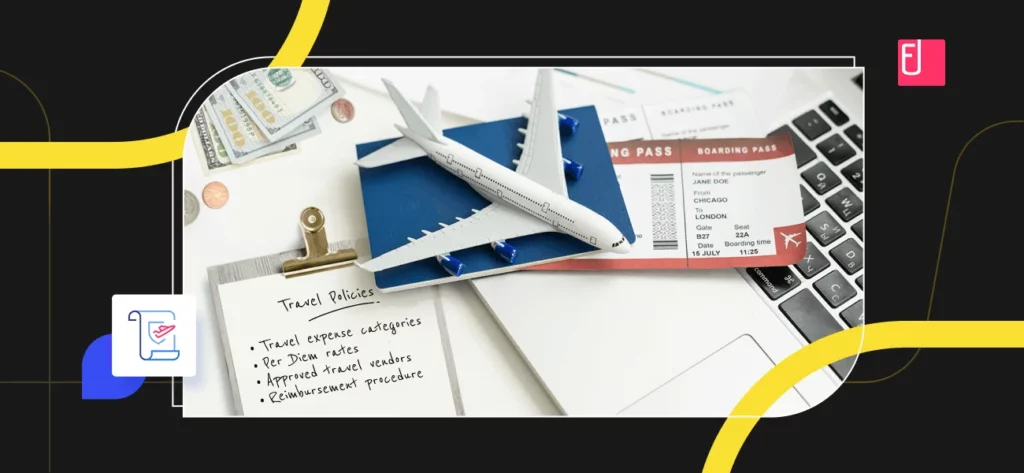
Online tools allow companies to optimize their travel policies and procedures. These tools facilitate the integration of policy requirements directly into the booking process, ensuring compliance and minimizing errors. The platforms can be configured to enforce company-specific restrictions, such as preferred suppliers, maximum daily spending limits, and mandatory pre-approval requirements.
Example Travel Policy (Partial):
“All business travel must be pre-approved through the company’s online travel management system. Employees are required to book flights and accommodations through the designated platform. Employees are responsible for adhering to the company’s expense reporting guidelines and submitting all receipts within 7 days of their return from travel. Flights must be booked at least 21 days in advance.”
Company Example: Acme Corporation
Acme Corporation implemented an online travel agent, reducing its annual travel expenses by 15% within the first year. They achieved this by standardizing travel policies, automating expense reports, and leveraging the platform’s data analytics features to identify cost-saving opportunities. Employee training was a key component of their successful implementation, enabling seamless adoption of the new system. Their comprehensive travel policy, embedded within the online platform, streamlined the entire process and ensured compliance.
Epilogue: Corporate Travel Agent Online
In conclusion, online corporate travel agents offer a compelling alternative to traditional methods. Their enhanced efficiency, cost savings, and user-friendly interfaces provide significant advantages for both businesses and travelers. As technology continues to evolve, online platforms are poised to play an increasingly crucial role in the future of corporate travel, promising even greater integration with other business applications and an enhanced user experience. The future of corporate travel is online, offering streamlined solutions for businesses of all sizes.
